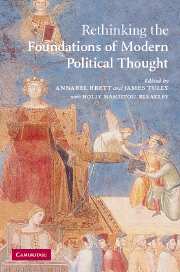Book contents
- Frontmatter
- Contents
- List of contributors
- Preface
- Part I Introduction
- Part II Rethinking the foundations
- 3 Foundations and moments
- 4 Skinner, pre-humanist rhetorical culture and Machiavelli
- 5 Unoriginal authors: how to do things with texts in the Renaissance
- 6 ‘The Best State of the Commonwealth’: Thomas More and Quentin Skinner
- 7 Scholasticism in Quentin Skinner's Foundations
- 8 Scholastic political thought and the modern concept of the state
- 9 ‘So meerly humane’: theories of resistance in early-modern Europe
- 10 Hobbes and democracy
- 11 A lion in the house: Hobbes and democracy
- 12 Hobbes and the foundations of modern international thought
- 13 Surveying The Foundations: a retrospect and reassessment
- Bibliography
- Index
4 - Skinner, pre-humanist rhetorical culture and Machiavelli
Published online by Cambridge University Press: 19 February 2010
- Frontmatter
- Contents
- List of contributors
- Preface
- Part I Introduction
- Part II Rethinking the foundations
- 3 Foundations and moments
- 4 Skinner, pre-humanist rhetorical culture and Machiavelli
- 5 Unoriginal authors: how to do things with texts in the Renaissance
- 6 ‘The Best State of the Commonwealth’: Thomas More and Quentin Skinner
- 7 Scholasticism in Quentin Skinner's Foundations
- 8 Scholastic political thought and the modern concept of the state
- 9 ‘So meerly humane’: theories of resistance in early-modern Europe
- 10 Hobbes and democracy
- 11 A lion in the house: Hobbes and democracy
- 12 Hobbes and the foundations of modern international thought
- 13 Surveying The Foundations: a retrospect and reassessment
- Bibliography
- Index
Summary
It has been suggested that The Foundations of Modern Political Thought is actually ‘a thesis book, highly polemical and with a profiled perspective of its own’. In what follows I would like to take this suggestion seriously and consider some of the interpretative choices and historiographical theses developed in that book. In particular, I will examine Quentin Skinner's theses on pre-humanist rhetorical culture and on the origins of humanism, and I will analyse his interpretation of Machiavelli and of the intellectual contexts necessary for an understanding of the Florentine Secretary. I will then show how these theses provide the basis for Skinner's historical and philosophical work of the 1980s, from the essays on Machiavelli and Lorenzetti to the essays on the ideal of political liberty. Lastly, I will discuss briefly some of his latest texts, from Liberty before Liberalism to Visions of Politics, and argue that Skinner has remained attached to the substance of his original historiographical theses, while widening the scope of his research and of his argument, and making some significant changes in the terminology in which they were couched. I will emphasise that Skinner's later work marks a shift in emphasis, but does not substantially modify his earlier presentation of modern political thought, of its conflicting vocabularies and its opposing traditions.
According to Skinner, if we want to understand the foundations or the origins of modern political thought we must return to the twelfth century. The opening chapter of Foundations takes the reader back to the comuni, the Italian cityrepublics and their experience of self-government: their practice of electing magistrates (first the consoli and then the podestà) and consigli.
- Type
- Chapter
- Information
- Rethinking The Foundations of Modern Political Thought , pp. 50 - 72Publisher: Cambridge University PressPrint publication year: 2006
- 2
- Cited by



